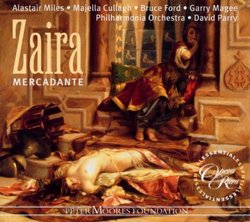| All Artists: Saverio Mercadante, David Parry, Philharmonia Orchestra of London, Alastair Miles, Bruce Ford, Claire Wild, Colin Lee, Garry Magee, Majella Cullagh Title: Mercadante: Zaira (Highlights) Members Wishing: 0 Total Copies: 0 Label: Opera Rara UK Original Release Date: 1/1/2003 Re-Release Date: 5/13/2003 Album Type: Import Genre: Classical Style: Opera & Classical Vocal Number of Discs: 1 SwapaCD Credits: 1 UPC: 792938022420 |
Search - Saverio Mercadante, David Parry, Philharmonia Orchestra of London :: Mercadante: Zaira (Highlights)
 | Saverio Mercadante, David Parry, Philharmonia Orchestra of London Mercadante: Zaira (Highlights) Genre: Classical |
Larger Image |
CD Details |
CD ReviewsA Rare Treat dwadefoley | New York, New York United States | 06/06/2003 (4 out of 5 stars) "Today, it is Bellini's Zaira that has been seen on modern stages, while Mercadante's has continued to molder in its grave; in the 19th century, Mercadante's was the one that enjoyed success. This recording is the first of a projected series of recordings ("Essential Opera Rara") in which Opera Rara records the major highlights from a particular forgotten work. A fine cast of Opera Rara mainstays, including the Irish soprano Majella Cullagh, the excellent tenor Bruce Ford, and bass Alistair Miles, interprets this interesting work with their usual attention to musical detail and dramatic realism. Aside from the rather disappointing final scene, in which the music does not quite capture the enormity of the tragic ending, the rest of the opera contains remarkably beautiful and enjoyable passages. Zaira's duet with Orasmane, her big tragic aria in the penultimate scene, and the exciting trio in Act II, are all remarkable for their emotional thrust and melodic inspiration. Mercadante's scrupulous attention to orchestration throughout the work is a treat. The most impressive singing comes from bass Alistair Miles, who is wonderful in the Tamburini role of Orasmane. The difficult (and abundant) coloratura poses no difficulties for Miles, who also uses his voice with great sensitivity to emotion; the tender affection of Orasmane for Zaira, his consuming jealousy, and his remorse and shock after he murders her, are painted with a varied and subtle palette of vocal colors. Almost his equal is Cullagh, whose voice (or so it seems to me) is progressively becoming more at home in dramatic roles such as this. Her rendition of the character's final aria is a tour de force, and proves just how effective Mercadante's music is in the right hands. Bruce Ford and Gary Magee have relatively less to do than Cullagh and Miles, but both sing with their usual consummate artistry. As is always the case with Opera Rara, the presentation of the set is nonpareil, with sumptuous and highly evocative art gracing the box cover and a substantial booklet accompanying the recording." Well orchestrated opera not devoid of melodic enchantment... J. E. ASENCIO-NEGRON | Guaynabo, Puerto Rico USA | 11/17/2003 (4 out of 5 stars) "The plot of this opera is very interesting & appealing, even though an Opera of the same name failed miserably in the stage for Vincezo Bellini (he went on to use the same music for "I Capuleti e I Montecchi" with an enourmous sucess)...However, in the 20th century and now it is Zaira of Bellini instead of Zaira of Mercadante which enchant audiences and saw several revivals. During the 19th century Mercandante's 60 operas were more performed... change in time, change in taste of the audience!The conflict this opera reflects the perils of the heart with a background of opposing religions: Orosmane (bass), the Muslim sultan of Jerusalem, and his slave, Zaira (soprano) are in love. When Nerestano (tenor) returns (former Orosmane's prisoner), he and Zaira seem attracted and Orosmane becomes jealous. The twist in the plot is that Zaira and Nerestano are brother and sister, the children of Lusignano (baritone), a prior King of Jerusalem. She (Zaira) later on discovers this, therefore must decide whether to remain a Muslim under Orosmane, or return as a Christian. In the final scene, Orosmane kills Zaira out of jealousy; before dying she says Nerestano is her brother, and Orosmane, realizing the big mistake he made, kills himself shortly afterwards.The musical detail and dramatic realism of Mercandante's orchestration is emotionally effective and melodically firm and pleasant. The love duet of Zaira/Orosmane, and the enjoyable trio of Act II, have very inspiring melodies supported by the orchestral varied texture. Nevertheless the final scene (with the high emotional and dramatic context provided by the plot)it is not as well translated to music by the composer... Said that, it is a well constructed opera with a fine thread of melodic stability with a very satisfying texture that entertains. A good, even though not excellent, accomplisment by Mercadante. For Opera Rara and the singers an A+!..."
|
